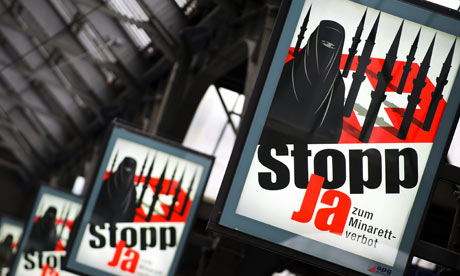Projections based on voting returns suggest Swiss have backed campaign to ban construction of minarets

Swiss poster calling for a yes vote in a referendum against minarets. Photograph: Fabrice Coffrini/AFP/Getty Images
Projections based on ballot results suggest Swiss voters have backed a campaign to ban the construction of minarets, local television reported.
The projections from state-owned DRS indicate Swiss support for the ban swung massively in recent days, from 37% in pre-vote polls to 59% in today's referendum.
Claude Longchamp, head of the respected gfs.bern polling institute, said the proposed ban was forecast to receive approval from more than half the country's 26 cantons, meaning it will become a constitutional amendment. The projections were based on actual voting returns.
Rightwing parties led by the nationalist Swiss People's party, the country's largest, have labelled minarets symbols of militant Islam.
A Geneva mosque was vandalised on Thursday when a pot of pink paint was thrown at the entrance. Earlier this month a vehicle with a loudspeaker drove through the area imitating a muezzin's call to prayer, and vandals damaged a mosaic when they threw cobblestones at the building.
Business leaders say a ban on minarets, the distinctive spires attached to mosques, would be disastrous for the Swiss economy because it could offend wealthy Muslims who bank in Switzerland, buy the country's luxury goods and visit its resorts.
The vote taps into anxieties about Muslims that have been rippling through Europe, ranging from French fears over women in burkas to Dutch alarm over the murder by a Muslim fanatic of the filmmaker Theo van Gogh, who made a documentary that criticised Islam.
Human rights defenders have objected to posters backing the proposed ban, which show minarets rising like missiles from the Swiss flag next to a fully veiled woman.
Minarets are typically built next to mosques for religious leaders to call the faithful to prayer. The four minarets already attached to mosques in Switzerland will remain even if the referendum passes.
Muslims make up about 6% of Switzerland's 7.5 million population, many of them refugees from the Yugoslav wars of the 1990s. Fewer than 13% practise their religion, the government says.

Aucun commentaire:
Enregistrer un commentaire